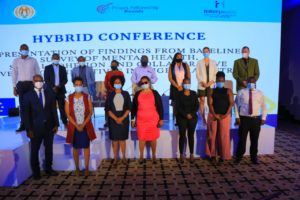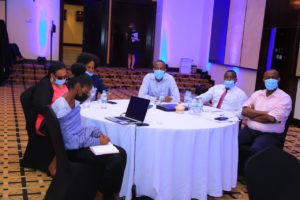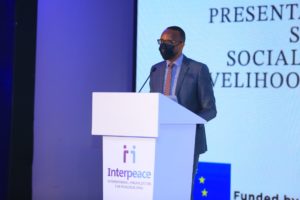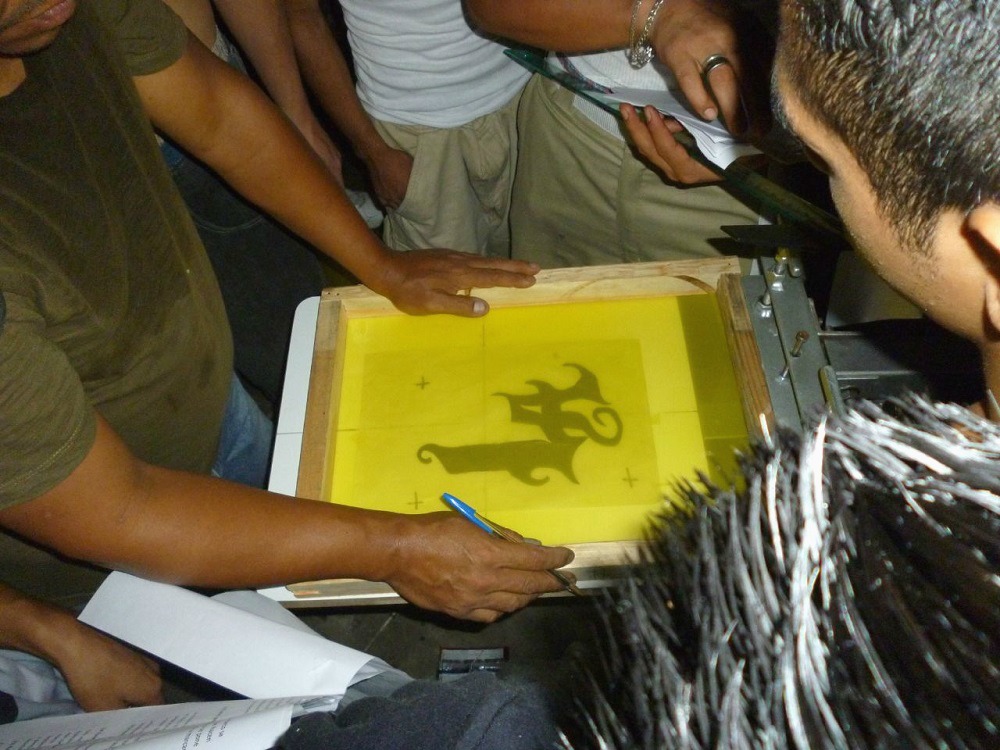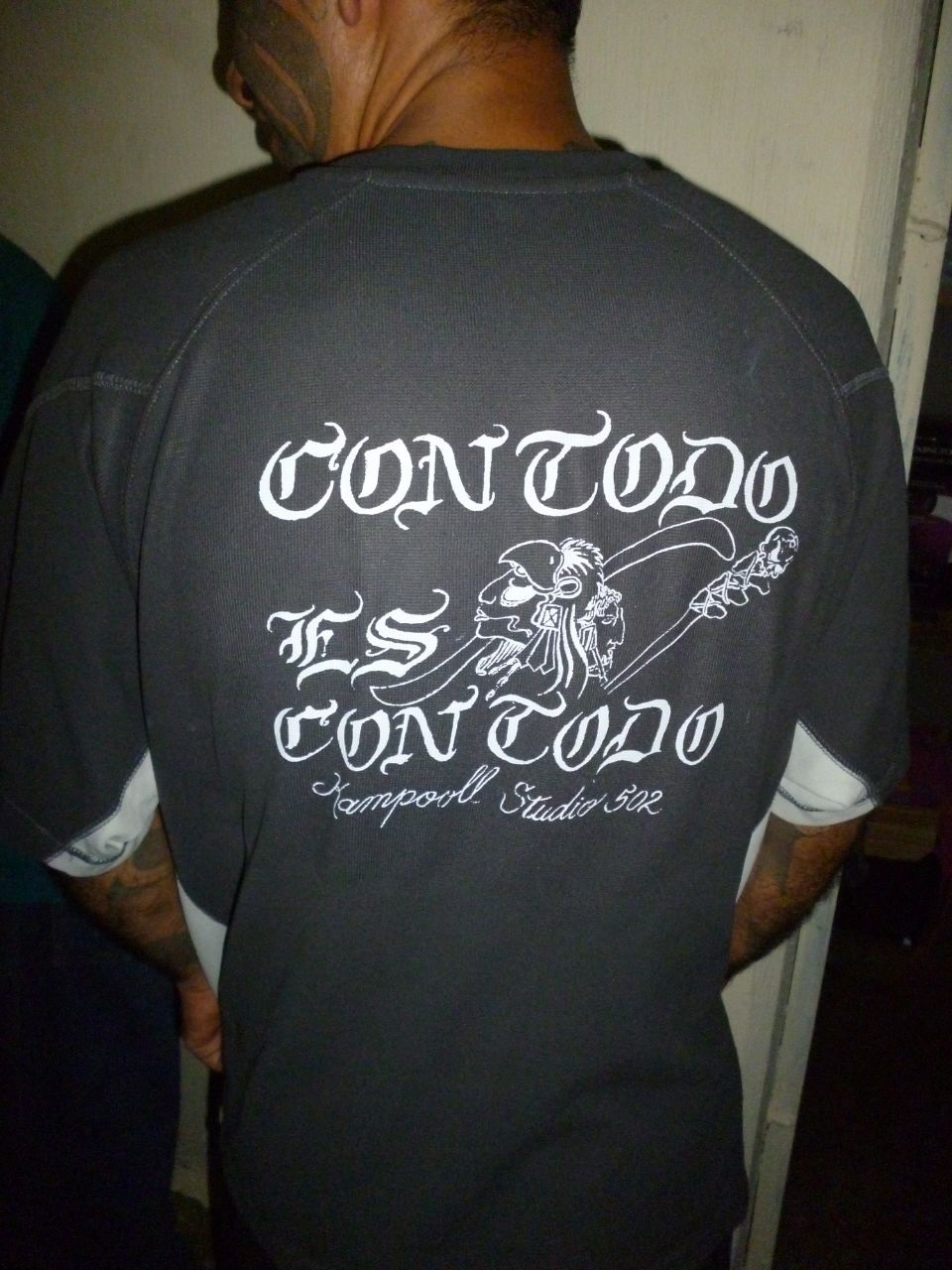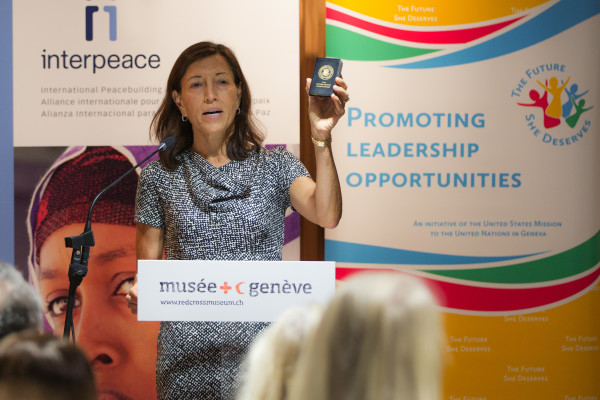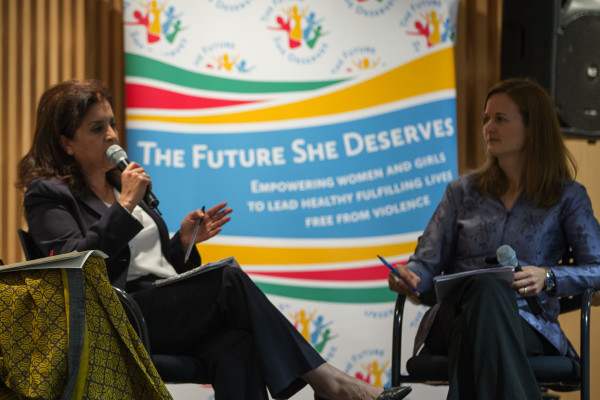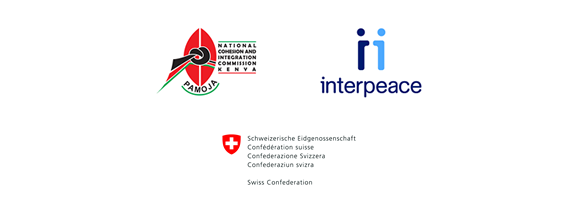Rwanda: new findings and protocols to improve mental health and social cohesion
Des études montrent une prévalence élevée de troubles de santé mentale au Rwanda. Cette empreinte du génocide de 1994 contre les Tutsi a rendu difficile la réconciliation et la guérison sociétale. Lors d'une conférence hybride dans la capitale Kigali, le 2 septembre 2021, Interpeace et ses partenaires ont présenté les résultats de la recherche de base menée sur la santé mentale et la guérison sociétale dans le district de Bugesera.
La conférence était organisée par Interpeace, en partenariat avec la Commission nationale pour l'unité et la réconciliation (NURC) et Prison Fellowship Rwanda (PFR). Elle a été soutenue par l'Union européenne (UE) à travers son ambassade au Rwanda.
Au cours de l'événement, les participants ont également discuté du développement de plusieurs protocoles, éclairés par cette enquête de base, pour évaluer les efforts en cours et intervenir sur les questions liées à la santé mentale, à la cohésion sociale et aux moyens de subsistance durables au Rwanda.
Depuis le génocide contre les Tutsi, le Rwanda a connu 27 années de développement et de croissance soutenus. Cependant, le pays continue de faire face à d'importants problèmes de santé mentale. Une proportion considérable de la population rwandaise vit avec un traumatisme lié au génocide contre les Tutsi.
“« Ma mère est toujours seule. Quand je lui pose une question sur ce qui s'est passé pendant le génocide, elle s’isole immédiatement dans une pièce pour pleurer et je me sens triste parce que je ne peux rien faire pour l'aider à se sentir mieux »,a déclaré un participant à l'étude de base.
Cette situation est aggravée par la détresse psychologique et socioéconomique qui a contribué à perturber la cohésion sociale. Ces conditions de santé mentale qui prévalent ont rendu difficile le rétablissement de la confiance et la réconciliation des gens au Rwanda.
“« Le Bugesera a beaucoup souffert du génocide contre les Tutsi. Les personnes traumatisées ont des difficultés à se pardonner et à se faire confiance, de même qu’à adopter le développement et des moyens de subsistance durables »,a déclaré le maire du district de Bugesera, Richard Mutabazi.
Cependant, le gouvernement rwandais et les organisations de la société civile locale ont déjà réalisé des investissements et des progrès importants dans la guérison des traumatismes, la cohésion sociale et l'amélioration des moyens de subsistance. Pour soutenir ces efforts en cours, la Commission nationale pour l'unité et la réconciliation, Prison Fellowship Rwanda et Interpeace ont commencé à mettre en œuvre la phase pilote d'un programme de guérison sociétale dans le district de Bugesera, qui a été le plus durement touché par le génocide contre les Tutsi. Cette étude de référence sur la santé mentale et la guérison sociétale faisait partie de ce programme, lancé en octobre 2020.
"Nous voulions évaluer l'état actuel des communautés du district de Bugesera, en ce qui concerne la santé mentale, la cohésion sociale et les moyens de subsistance collaboratifs, puis utiliser les données comme base pour développer des protocoles d'intervention pour le district et au-delà", a expliqué le représentant d’Interpeace au Rwanda et dans la région des Grands Lacs, Frank Kayitare. « Nous avons obtenu une contribution inestimable des organisations gouvernementales et non gouvernementales. Ces intrants ont rendu notre programme plus réactif, permettant un résultat potentiellement plus résilient ».
La présentation des résultats de cette étude lors de la conférence, le 2 septembre, a marqué l'achèvement de la première étape de ce programme pilote, connue sous le nom de « Renforcement des capacités communautaires pour la cohésion sociale et la réconciliation par la guérison des traumatismes sociétaux dans le district de Bugesera ».
« Nous sommes très heureux de voir ce projet aboutir après plusieurs discussions qui ont commencé sur ce sujet très important entre Interpeace, le gouvernement, l'UE et d'autres partenaires il y a plus d'un an », a déclaré l’ambassadeur de l'UE au Rwanda, Nicola Bellomo.
Le défi de la santé mentale au Rwanda est multidimensionnel. Le manque de remords et de pardon, l'impunité et la pauvreté ont tous été cités dans la recherche comme des facteurs qui sous-tendent la méfiance entre les groupes sociaux. Un autre aspect important révélé par l'étude était le défi de la réinsertion réussie des auteurs de génocide condamnés qui ont terminé leur peine de prison. Plus précisément, il a été constaté que la réintégration est très souvent une expérience extrêmement difficile, pour les anciens prisonniers mais aussi pour les communautés qui les accueillent. Les problèmes de stigmatisation sociale, de rejet par la famille et d'incapacité à maintenir des moyens de subsistance ont été les plus fréquemment signalés parmi les ex-détenus libérés. Ces défis sociaux auxquels sont confrontés les ex-prisonniers aggravent les problèmes causés par une longue période d'incarcération, qui incluent la perte d'identité sociale et professionnelle, l'érosion des relations familiales et de l'expression émotionnelle, de même que la perte d'espoir dans l'avenir.
« Les défis au niveau communautaire ne sont pas seulement unidimensionnels et nécessitent un effort de collaboration. Ce qui se passe au Rwanda est un exemple révolutionnaire et brillant. Nous devrions penser à l'évolutivité de ces initiatives pour un meilleur résultat », a déclaré ée représentant régional principal pour l'Afrique orientale et centrale chez Interpeace, Theo Hollander.
- Credits: Interpeace
En termes de moyens de subsistance, l'enquête de base a révélé des preuves de difficultés économiques. Les gens luttent pour survivre aussi bien qu'ils le peuvent dans des circonstances défavorables. Un défi clé qui a émergé de l'étude est la faible production agricole qui contribue à l'insécurité alimentaire. Le recours à l'agriculture pluviale, l'accès insuffisant aux terres irrigables, l'utilisation limitée d'engrais et la propriété limitée de bétailsont tous en cause. Les résidents comptent inévitablement sur les marchés pour compléter leurs approvisionnements alimentaires, ce qui à son tour pousse les jeunes à des rôles de travail subalternes afin de générer les liquidités nécessaires, réduisant leur disponibilité pour participer à l'éducation et à la formation. Les compétences professionnelles faisaient défaut dans le district, la grande majorité des personnes interrogées déclarent que leur seule compétence professionnelle est l'agriculture avec des outils de base.
« Notre objectif au Rwanda est de développer des interventions complètes, d'associer des solutions rwandaises locales aux meilleures pratiques internationales et d'utiliser plusieurs types de preuves pour améliorer la santé mentale », a déclaré le directeur exécutif adjoint de Prison Fellowship Rwanda, Ntwali Jean Paul.
L'étude a également évalué les perspectives et la dynamique du genre et des jeunes en termes de santé mentale, de relations familiales, de réinsertion des prisonniers et de moyens de subsistance. Elle a révélé que les femmes du district de Bugesera ont été profondément affectées par le génocide, par diverses voies directes et indirectes. En ce qui concerne la santé mentale, l'étude a révélé que plus de femmes que d'hommes ont signalé des problèmes d'anxiété et de dépression. En ce qui concerne la transmission intergénérationnelle des héritages du génocide, l'étude a identifié deux défis majeurs pour les jeunes ; le premier est de grandir dans une famille dans laquelle les parents souffrent de problèmes psychosociaux étendus en raison de leurs expériences traumatisantes, dans la mesure où cette situation mine leur capacité en tant que parents. La seconde est la difficulté pour les parents de discuter des événements et des expériences qui provoquent souvent chez leurs enfants un sentiment de confusion, de colère ou d'insécurité.
« La santé mentale est cruciale pour faire progresser la cohésion sociale au Rwanda. Les équipes d'Interpeace Rwanda, de la Commission nationale pour l'unité et la réconciliation, du ministère de la santé et de Prison Fellowship Rwanda ont aidé les Rwandais et le gouvernement à relever ces défis et traumatismes liés à la santé mentale et nous nous engageons à en faire plus avec nos partenaires », a déclaré le président d'Interpeace, Scott Weber.
Les résultats de l'enquête de base ont informé le développement de plusieurs nouveaux protocoles d'évaluation et d'intervention, qui guideront les efforts futurs liés à la santé mentale, à la cohésion sociale et aux moyens de subsistance durables au Rwanda. L'ensemble de ceux-ci comprenait une intervention holistique de santé mentale et de soins psychosociaux combinant des solutions locales rwandaises avec les meilleures pratiques internationales. Plus précisément, les protocoles de dépistage visaient à évaluer la population communautaire et à affecter les participants aux interventions, en fonction de leurs besoins individualisés. Parmi les autres dispositifs développés, il existe un protocole de thérapie axé sur la résilience et un programme de compétences socio-émotionnelles pour les soins de santé mentale ; espace de ressourcement multifamilial et adaptations des protocoles de sociothérapie pour la cohésion sociale ; évaluation des risques et de la résilience des détenus et protocoles de réhabilitation des détenus et feuille de route pour la réinsertion ; ainsi qu'un protocole collaboratif sur les moyens de subsistance pour guider le développement des entreprises communautaires.
Vous pouvez écouter l'enregistrement de la conférence ici : https://spoti.fi/3zOnMod
Notre programme de guérison sociétale au Rwanda renforce les capacités des communautés grâce à une approche innovante et holistique pour accroître les investissements dans la santé mentale, lutter contre les traumatismes et faire progresser la cohésion sociale. Le programme est financé par l'UE à travers son instrument contribuant à la stabilité et à la paix (IcSP).
